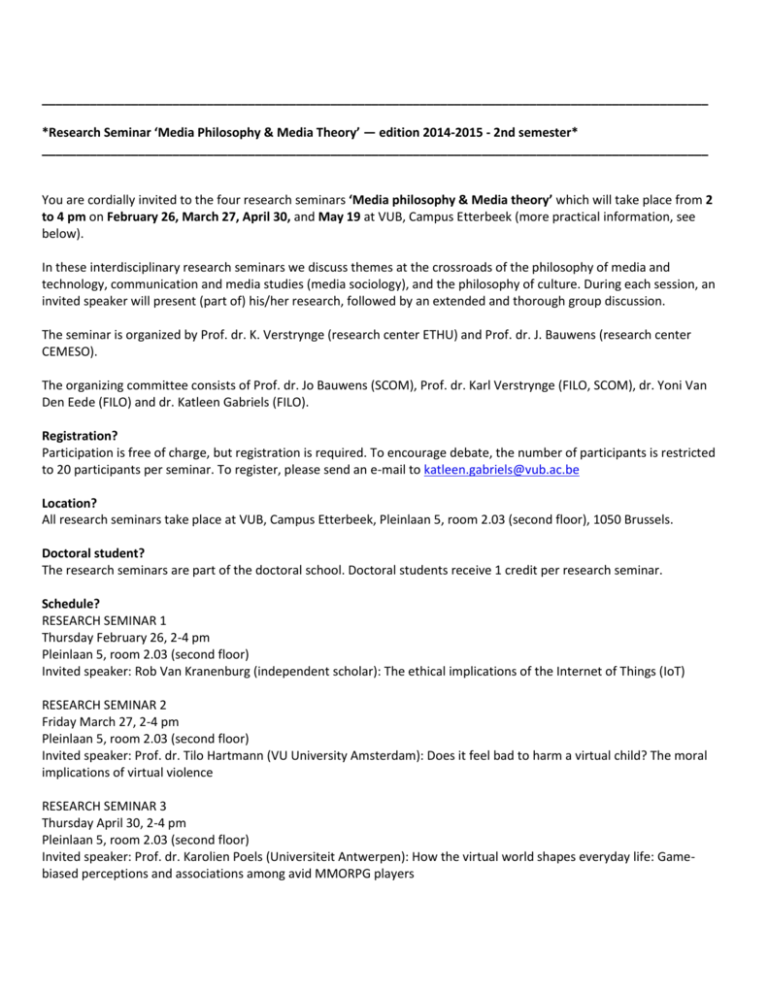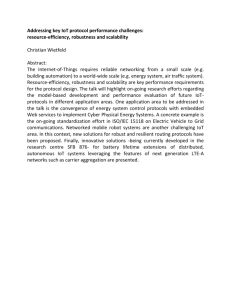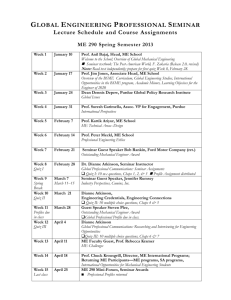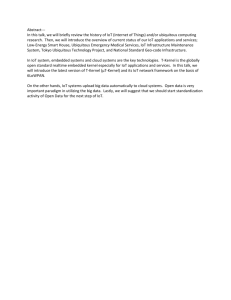*Research Seminar `Media Philosophy & Media Theory` — edition
advertisement

_________________________________________________________________________________________________ *Research Seminar ‘Media Philosophy & Media Theory’ — edition 2014-2015 - 2nd semester* _________________________________________________________________________________________________ You are cordially invited to the four research seminars ‘Media philosophy & Media theory’ which will take place from 2 to 4 pm on February 26, March 27, April 30, and May 19 at VUB, Campus Etterbeek (more practical information, see below). In these interdisciplinary research seminars we discuss themes at the crossroads of the philosophy of media and technology, communication and media studies (media sociology), and the philosophy of culture. During each session, an invited speaker will present (part of) his/her research, followed by an extended and thorough group discussion. The seminar is organized by Prof. dr. K. Verstrynge (research center ETHU) and Prof. dr. J. Bauwens (research center CEMESO). The organizing committee consists of Prof. dr. Jo Bauwens (SCOM), Prof. dr. Karl Verstrynge (FILO, SCOM), dr. Yoni Van Den Eede (FILO) and dr. Katleen Gabriels (FILO). Registration? Participation is free of charge, but registration is required. To encourage debate, the number of participants is restricted to 20 participants per seminar. To register, please send an e-mail to katleen.gabriels@vub.ac.be Location? All research seminars take place at VUB, Campus Etterbeek, Pleinlaan 5, room 2.03 (second floor), 1050 Brussels. Doctoral student? The research seminars are part of the doctoral school. Doctoral students receive 1 credit per research seminar. Schedule? RESEARCH SEMINAR 1 Thursday February 26, 2-4 pm Pleinlaan 5, room 2.03 (second floor) Invited speaker: Rob Van Kranenburg (independent scholar): The ethical implications of the Internet of Things (IoT) RESEARCH SEMINAR 2 Friday March 27, 2-4 pm Pleinlaan 5, room 2.03 (second floor) Invited speaker: Prof. dr. Tilo Hartmann (VU University Amsterdam): Does it feel bad to harm a virtual child? The moral implications of virtual violence RESEARCH SEMINAR 3 Thursday April 30, 2-4 pm Pleinlaan 5, room 2.03 (second floor) Invited speaker: Prof. dr. Karolien Poels (Universiteit Antwerpen): How the virtual world shapes everyday life: Gamebiased perceptions and associations among avid MMORPG players RESEARCH SEMINAR 4 Thursday May 19, 2-4 pm Invited speaker: Prof. dr. Johnny Søraker (University of Twente): When is the virtual real? Meaning, relationships and well-being in virtual worlds More extensive information on the speakers and their talks can be found below. We hope to welcome you at our research seminars! Best wishes, Jo Bauwens Karl Verstrynge ___________________________________________________________________________________________________ February 2015 Rob Van Kranenburg (independent scholar) Thursday February 26, 2015: 2-4 pm Title: The ethical implications of the Internet of Things (IoT) Abstract: Internet of Things (IoT) is a paradigm shift and an ontological change. Our very notions of what it means to be human and what it means to be ‘in the world’ are based on subject-object dichotomies. IoT brings a third party into the equation, a database, algos and scenario reality that is always present in any interaction between object and subject. This is not an indifferent reality, however, but one of real stakeholders and investors. Where are you in this transition? We would like to start an open-ended discussion on the underlying aims of IoT and to explore its societal and ethical challenges, by presenting the following questions: http://www.theinternetofthings.eu/questions-iot Biography: Rob van Kranenburg wrote The Internet of Things. A critique of ambient technology and the all-seeing network of RFID, Network Notebooks 02, Institute of Network Cultures. He is co-founder of bricolabs and the founder of Council. Together with Christian Nold he published Situated Technologies Pamphlets 8: The Internet of People for a Post-Oil World. He currently works as Community Manager at the EU Project Sociotal. He is consultant to IoT China, Shanghai 2014. He Chairs AC8 - Societal Impact and Responsibility in the Context of IoT Applications of the IERC, The European Research Cluster on the Internet of Things. March 2015 Prof. dr. Tilo Hartmann (VU University Amsterdam) Friday March 27, 2015: 2-4 pm Title: Does it feel bad to harm a virtual child? The moral implications of virtual violence Abstract: Video games range among the most popular virtual media applications. A common theme in video games is violence. But how do users experience virtual violence? Users’ may experience violence in video games primarily in a state of moral disengagement in which they perceive their own actions as being directed against seemingly real or existing social beings, but also as appropriate and instrumental. This is the basic assumption of the “moral disengagement in violent video games model” that I developed based on a series of studies. I will outline the theoretical rationale of the model and existing empirical evidence. In this context, I will also briefly tap into my recent ideas about a dual-system model of perceived media reality that tries to explain how we feel vs. think about reality while processing virtual media, including characters in video games. Recommended readings Hartmann, T. (2011). Players’ experiential and rational processing of virtual violence. In S. Malliet & K. Poels (Eds.), Vice City Virtue. Moral Issues in Digital Game Play (pp. 135-150). Leuven: Acco. Hartmann, T. (2012). Moral disengagement during exposure to media violence: Would it feel right to shoot an innocent civilian in a video game? In R. Tamborini (Ed.), Media and the Moral Mind (pp. 109-131). New York, NY: Routledge. Biography: Dr. Tilo Hartmann is an Associate Professor at the Department of Communication Science at the VU University Amsterdam. He holds a PhD in Communication Science from the University of Music, Drama and Media Hannover. In his research he applies media-psychological approaches and methodology to study people's experience of mediated illusions (e.g., parasocial interaction, presence, virtual violence), media choice, and health communication behavior. Tilo Hartmann is editor of the book Media Choice: A theoretical and empirical overview, and editorial board member of Journal of Communication, Human Communication Research, and Media Psychology. April 2015 Prof. dr. Karolien Poels (Universiteit Antwerpen) Thursday April 30, 2015: 2-4 pm Title: How the virtual world shapes everyday life: Game-biased perceptions and associations among avid MMORPG players Abstract: A substantial part of digital gaming research has focused on what happens after game-play. Both negative effects (e.g. aggressive behavior) and positive effects (e.g. bonding, leadership training) have been documented. Less is known about how playing digital games affects the daily life of players in subtler, perhaps even more mundane, ways. Inspired by the concept of brain plasticity and based on findings from human perception theory, I will explain that -due to specific characteristics of digital games- elements from the virtual game environment can be transferred to the players’ perceptual and experiential mental system. As a consequence, their perception and interpretation of real-life environments will be (partly) shaped by the virtual game environment. In this talk I will elaborate on these so-called game-biased perceptions and associations. Based on recent empirical work in the context of Massive Multiplayer Online Role-Playing Games, I will discuss the theoretical underpinnings, the manifestation of the phenomenon, and challenges for future research. Recommended readings Poels, K., IJsselsteijn, W. A., & de Kort, Y. A. W. (2014). World of Warcraft, the Aftermath: How Game Elements Transfer into Perceptions, Associations and (Day)dreams in the Everyday Life of Massively Multiplayer Online Role-Playing Game Players. New Media & Society: http://dx.doi.org/doi:10.1177/1461444814521596 Biography: Karolien Poels is an Associate Professor of Strategic Communication at Department of Communication Studies, University of Antwerp, Belgium. She is a member of the research group MIOS (Media & ICT in Organizations & Society). She holds an MA in Communication Studies and a PhD in Social Sciences, both from Ghent University. She worked as a postdoctoral researcher at the Human technology Interaction Group of Eindhoven University of Technology. Her research topics include: 1) advertising and consumer psychology and 2) digital games and social media. Emotions form a central topic in (most of) her studies. May 2015 Prof. dr. Johnny Søraker (University of Twente) Thursday May 19, 2015: 2-4 pm Title: When is the virtual real? Meaning, relationships and well-being in virtual worlds Abstract: Whether my life fares well or not seems inextricably related to whether the states of affairs that contribute to my well-being are real or not. Thus, we are constantly exposed to and troubled by claims of unreality: Is this real love? Get a real life! What is my real identity? Is she a real friend? Am I escaping my real obligations? Is there really a God? We are either relieved or disappointed when a particularly lifelike dream turned out not to be real, or by realizing that a particular state of affairs turned out not to be true after all. When so much of our lives and well-being is tied up with concerns and claims about reality, it should come as no surprise that the impact of virtuality on our lives is a controversial topic. Indeed, philosophers, policy makers, researchers and journalists often make claims to the effect that wasting one’s life on virtual surrogates for the real thing amounts to being bereaved of what real life has to offer; that virtual worlds, entities and experiences might give immediate gratification, but not deliver the kind of authentic happiness that a life engaged with reality can offer. In this lecture, I will discuss to what extent virtual worlds and entities are “real”, whether the things we regard as meaningful in life can be replaced by virtual surrogates, and more generally how virtual environments of various sorts can affect our well-being. Biography: Dr. Johnny Hartz Søraker is Assistant Professor of Philosophy of technology at the Department of Philosophy, University of Twente. He defended his PhD cum laude at the same department, dealing mainly with the epistemology, ontology and ethics of virtual worlds, with a particular focus on their potential impact on personal well-being. Søraker's main research interests and publications lie in the intersections between Information Technology, on the one hand and both theoretical and practical philosophy, on the other. He often grounds his work in psychological research, especially work in the field of Positive Psychology and is developing this toward a comprehensive methodology entitled “PrudentialEmpirical Ethics of Technology (PEET)”.







